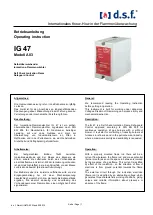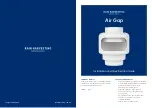
Chapter 8 Maintenance and inspection
66
8.3. Lubricant replacement
8.3.1. Lubricant replacement time
When this product is operated with an appropriate amount of lubricant,
the standard lubricant
replacement time due to lubricant degradation is 20,000 hours.
However, when operation involves a
reduction gear surface temperature above 40°C (the
area in the right diagram), the state of the
lubricant should be checked in advance and the grease replaced earlier as necessary. For the lubricants
specified by Nabtesco, refer to “4.2.7 Lubricants”
8.3.2. Lubricant replacement procedure
This section describes how to replace lubricants.
Perform steps 1 to 7 by taking care regarding the following
precautions.
When handling the lubricant, be sure to wear protective goggles
and rubber gloves.
Check the amount of drained lubricant by catching it with a
container, etc., in order to control the same amount of lubricant to
be drained and filled.
When replacing the lubricant, turn OFF the power source (e.g., power supply) and execute
lock-out/tag-out so that the power will not be turned ON by accident. Otherwise, you could be caught
by the rotation section, which will result in injury.
If the lubricant gets in your eyes or touches your skin, it could cause inflammation.
When the safety cover near the reduction gear has been removed for replacement/maintenance of
lubricant, be sure to return them to their original positions after the procedure.
If the lubricant is overfilled, there is a possibility of high internal pressure and that an oil seal could
fall off, the lip could be reversed, or lubricant could leak. If the lubricant is insufficient, a lubrication
failure could occur and the reduction gear could be damaged.
If the filling amount of the lubricant is insufficient, it could cause premature damage to the reduction
gear.
The shape of the reduction gear may differ from the illustration in Fig. 8-2 above, depending on the
ordered specifications. For details on the shape, refer to the catalog and the separately provided
“Outer dimensions” drawings and specification sheet.
Note
Fig. 8-1
Ambient temperature (°C)
R
ed
uc
tio
n
ge
ar
s
ur
fa
ce
te
m
pe
ra
tu
re
(
°C
)
















































